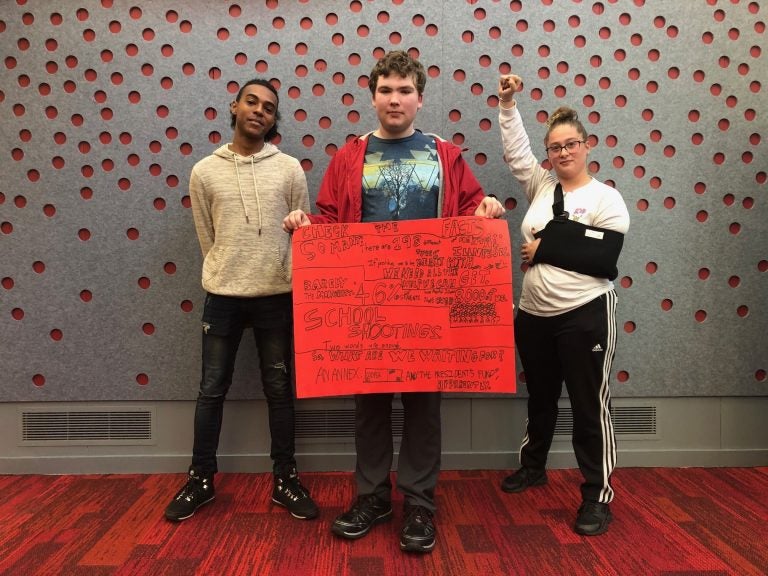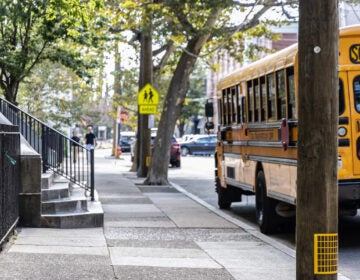Students blast Pa.’s largest community college for cutting campus mental health services while spending big on renovations
'Where’s your money going?' one student asked of the college. 'Because there are people who don’t have insurance who really rely on these services for help.'

From left, Marshall Everett, Ed Peters, and Sabrina Herb protest the cuts to campus mental health services at HACC, Central Pennsylvania's Community College, on Oct. 23, 2019. (Aneri Pattani/Spotlight PA)
This article was originally posted on PA Post.
–
On days that 19-year-old Sabrina Herb feels overwhelmingly anxious or depressed, her first stop is the counseling office at HACC, Central Pennsylvania’s Community College.
It’s one of the only places she can turn to for help. She has no car, and on class days, she takes two buses and walks a mile to get to the Harrisburg campus from her Penbrook home. Over the past year, the college counselors have come to know her, listening to her vent and helping her problem-solve.
So when Herb learned the college had eliminated its campus mental health services, she was outraged.
“Are they serious?’” Herb said in an interview at a campus sit-in organized by students protesting cuts. “There is no benefit to taking away mental health services.”
“I’m going to let them know I’m standing my ground to say these services need to be here.”
In September, HACC — with campuses in Harrisburg, York, Lancaster, Lebanon, and Gettysburg — told counselors to stop individual and group counseling. Instead, students with mental health needs would be sent to a dean of student affairs, who would refer them to an off-campus provider.
The change, which was never publicly announced to students, was first reported by Spotlight PA.
Since then, angry and disappointed students have blasted the college’s decision, calling HACC hypocritical for cutting mental health counseling to save money while continuing to fund big-ticket campus renovations. Many are calling for services to be reinstated immediately.
“They should bring them back,” said Will Trinh, a 20-year-old student at the Harrisburg campus. “These services are essential to the wellbeing of students and if HACC isn’t providing that, then the school isn’t doing its job to care for students.”
The president of the college, John Sygielski, said eliminating campus mental health counseling was part of a larger reorganization to address a $2.7 million budget deficit. He also said there had been an increase in demand for virtual services and flexible appointment times outside typical office hours.
“While the College needs to be fiscally responsible and modify or eliminate certain services, it is doing so with students’ academic success and well-being at the forefront,” the college said in an Oct. 23 statement.
But students say the college isn’t putting them first.
Kelsey Thomas, a 22-year-old student at the Harrisburg campus, said she was so angry when she heard the news that she cried. She said the college isn’t “listening to those who are asking for help.”
“Where’s your money going?” Thomas asked of the college. “Because there are people who don’t have insurance who really rely on these services for help.”
In recent years, HACC has purchased new buildings and renovated old ones at several of its campuses. In 2017, it completed a $12 million renovation of the Cooper Student Center in Harrisburg.
Although the student center project is being paid through fundraising, the other renovations are included in HACC’s operating budget. Since 2016, the college’s debt service has grown by 38%, according to budget documents posted to its website.
The mental health counseling services previously offered on campus were free. Thomas said she’s uninsured and suffers from severe anxiety, and though she had yet to make use of the service, she always felt more comfortable knowing someone was there in case she faced a crisis.
A 2016 report found that nationally, 13.5% of community college students are uninsured. Out-of-pocket costs for therapy often run upwards of $80 per hour. Even with insurance, copays can start at $20.
Sygielski said the college is in discussions with a third party to provide clinical services at low or no cost.
College mental health experts said eliminating on-campus counseling is risky given the persistent rise in the number of students experiencing depression, anxiety, and suicidal thoughts. Suicide is the second-leading cause of death for that age group, and the demand for campus counseling services has nearly doubled over the past decade.
Elizabeth Bolden, president, and CEO of the Pennsylvania Commission for Community Colleges said colleges would like to be doing more, “but they simply can’t.”
State funding for Pennsylvania’s 14 public community colleges was cut by 10% in 2011. Since then, year-to-year funding has either stayed flat or increased only slightly. At the same time, enrollment at colleges nationwide has fallen, leaving many universities with large budget deficits.
In 2014, HACC served about 20,000 students. This year, that number is 17,400.
Public community colleges in Pennsylvania eliminated 2,724 employee positions from 2013 through 2018, Bolden said, and some have outsourced their bookstores and food services. HACC’s decision is just the latest example of trimming services, she said.
Three of Pennsylvania’s other public community college systems also refer students off-campus for mental health counseling. Two of them are significantly smaller than HACC, but the Community College of Allegheny County is comparable, serving more than 15,000 students across four campuses.
The remaining 10 public community colleges offer on-campus mental health services, with the number of full-time counselors ranging from one at Pennsylvania Highlands Community College to 20 at the Community College of Philadelphia.
Eliminating campus mental health services runs counter to the findings of a 2018 school safety report released by Auditor General Eugene DePasquale and Gov. Tom Wolf, which called for an increase in access to mental health services within the state’s K-12 schools.
College students are likely facing similar concerns, DePasquale said in an interview.
“It’s important they don’t have to jump through hoops to get services,” he said.
For now, HACC students are trying to fill the gap themselves. In a Facebook group, one student offered her services as a certified peer support specialist and others discussed when therapy dogs would be visiting campus.
Jennifer Beachtel, a 33-year-old student at the Gettysburg campus, is trying to start a mental health awareness club. She knows it can’t replace counseling services, but hopes it will help.
“I can’t fix the problem,” she said. “I can only provide peer assistance and advocacy.”
 Spotlight PA is an independent, nonpartisan newsroom powered by The Philadelphia Inquirer in partnership with the Pittsburgh Post-Gazette and PennLive/The Patriot-News. Sign up for our free weekly newsletter.
Spotlight PA is an independent, nonpartisan newsroom powered by The Philadelphia Inquirer in partnership with the Pittsburgh Post-Gazette and PennLive/The Patriot-News. Sign up for our free weekly newsletter.
WHYY is your source for fact-based, in-depth journalism and information. As a nonprofit organization, we rely on financial support from readers like you. Please give today.




